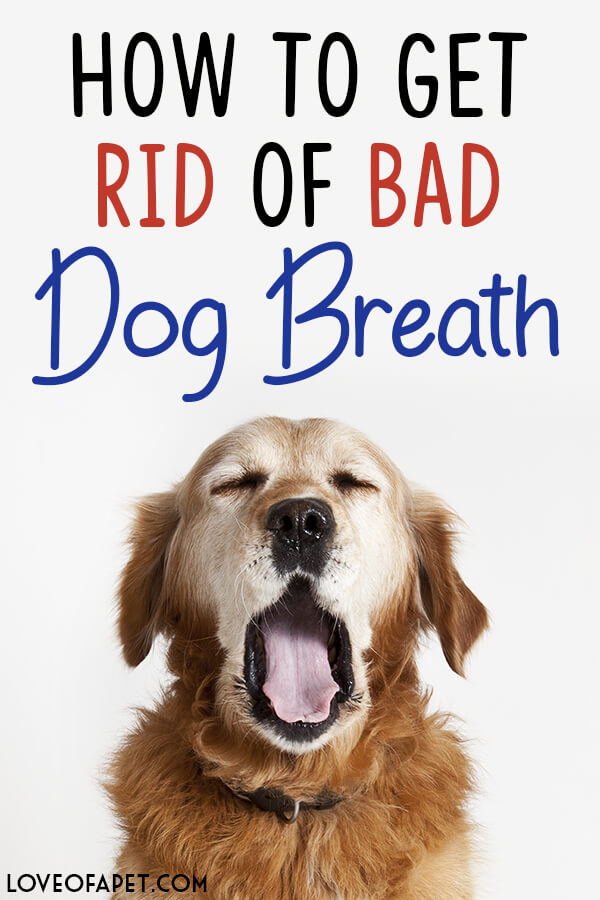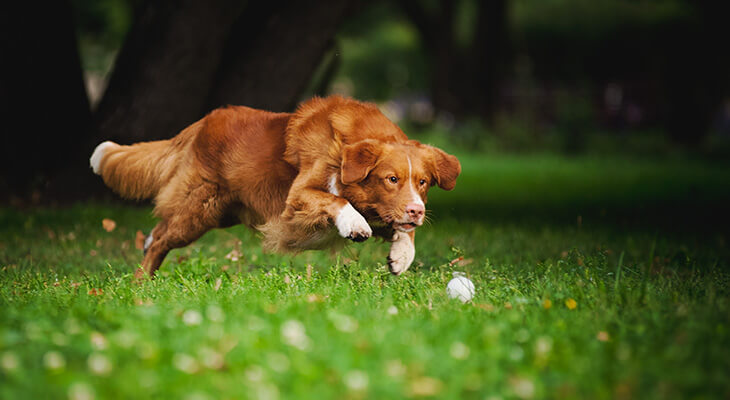Dogs are known for giving unconditional love to their owners. They are one of the most loyal companions; at times, they are more loyal than our human best friends – true stories of the dogs who wait patiently and endlessly to their owners will prove this. Not only that dogs wait patiently, as soon as their owners arrive home from their tiresome day, they immediately greet them joyfully as if they haven’t seen them in months. They are the sweetest, aren’t they?
Dogs do not only serve as pets, but they also provide feelings of security to their owners; that’s why many dog-owners will treat them as part of their family. Truly, dogs are man’s best friend. Any dog-lovers would agree that dogs are their stress relievers. But what if your dog’s breath starts to become stinky? Stressful, isn’t it? Read along to find out about the causes, treatments, and ways to prevent bad breaths in dogs.
Contents
What Causes Bad Breath in Dogs and How to Fix It
The treatment of your dog’s halitosis depends on the cause. Herewith are the common problems that cause bad breath in dogs:
1) Periodontal Disease
An infection or inflammation resulting from degeneration or loss of strength in the construction of teeth.
Pathophysiology of the disease:
When bacteria and food mixes, then accumulate within the gums and therefore forming plaques, eventually it transforms into calculus (commonly called tartar).
Calculus causes inflammation to gums (commonly called gingivitis)
Over a while, calculus develops under gums which results to:
Separation of teeth damages oral ligaments and bacterial growth in between teeth spaces.
Destruction of the ligaments permits bacteria to invade the blood circulation entering various system such as a cardiovascular, digestive and urinary system which result in.
Critical Condition
Aside from bad breath, the absence of a desire to eat is another cue that your dog may have a periodontal problem. This is due to painful toothache and or caused by the accumulation of harmful substances in the dog’s body (advanced stage).
Diagnostics include a thorough examination of the oral cavity and X-ray (to confirm the extent).
Treatment: Depending on the result of the medical examination and current state of the illness. Antibiotics are prescribed to keep away bacteria from proliferating throughout a dental procedure.
For mild stage (1-2): Full cleaning of the entire gums to remove visible plaque.
- Usage of a device such as ultrasonic scaler to remove calculus.
- Some vets result in polishing the teeth to be able to fill any crevice so that bacteria cannot stick itself hence stops plaque formation.
For more serious stage (3-4): Full cleaning and other procedures such as:
- Root scaling, planing, and curettage: take out the sick teeth and tissues and smoothens the top part of the dental root.
- Gingivectomy: removes diseased gums surgically.
- Periodontal Surgery: another surgery where they create an opening to the affected area and expose the affected root to clean and to treat with antibiotics directly then sealed with stimulants specifically for bone development added.
2) Gland Problems
A dog with butt problems may seem to be licking its anus frequently wherein substances that are released in the anal area can set down into his oral cavity. This can smell really unpleasant and could mean that the anal gland needs proper attention and prompt treatment. The anal gland normally releases a very strong smell even stronger than the smell of feces. Normal release occurs at the time of defecation. If you notice a foul fishy odor on your dog, it could be a sign that the gland is abnormal. You should get him to be seen by a veterinarian.
Other Signs of Gland Problems in Dog Includes:
- Scooting
- Licking or biting his rear end
- A foul odor
- Constipation
- Pain in defecating and in sitting
3) Medical Conditions:
Several diseases could cause bad breath to dogs, including diabetes and kidney disease.
Diabetes
the body doesn’t make enough insulin or it cannot use insulin effectively. Insulin breaks down glucose in the blood so it can enter the cell and provide energy. If the body cannot get its energy from glucose, it starts burning fat-releasing ketones. Acetone is a type of ketone and has a fruity smelling odor. If a dog has diabetes, its breath is usually slightly sweet and fruity.
Other Signs of Diabetes in Dog Includes:
- Excessive Thirst
- Increased Urination
- Weight Loss
- Increased Appetite
Treatment: Diabetes like in humans are incurable but can be controlled by proper diet, exercise and insulin injections.
Kidney disease
Metabolic diseases like kidney disease or kidney failure decrease kidney function resulting in acquiring too much ammonia inside the body causing dogs’ bad breath or are commonly known as ammonia breath.
Different Signs of Kidney Disease in Dog Includes:
- Change in water consumption
- Too much or too little urine volume
- Depression and listlessness
- Change in appetite
- Vomiting
Treatment: Depending on the severity of the disease, if it is acute or chronic, treatment may include the following:
- Medication that encourages urine production
- Fluid therapy
- Management of blood electrolyte abnormalities
- Monitor Urine output
- Control of vomiting
- Medication for gastrointestinal problems
- Dialysis
- Dietary Management
- Correction of anemia
- Management of blood problem
Preventive Measures: Dog’s Bad Breath Remedies
The best remedy for a dog’s bad breath is through prevention. Finding the cause and fixing it corrects the problem accordingly. Your personal veterinarian is the right person to help you check the cause and help you treat the problem as well.
Raw diet: Making a well-balanced diet yourself using fresh ingredients is a good way to ensure you are giving your dog the proper nutrients it needs. A raw food-based diet is a good choice to eliminate bad breath for dogs. Grains, sugars and other preservatives are added to Commercial dog foods causing problems to dog’s health.
Coconut Oil: Has antifungal and antibacterial properties to help lessen or eliminate a dog’s foul breath. It keeps the dog’s gums on the right condition and prevents bacteria build-up. It is good for a dog’s digestion, metabolic and immune system, plus it adds up to a dog’s cognitive capability.
Lemon: The juice helps kills bacteria from living inside the dog’s mouth, preventing the foul smell. It acts as a bleach in the mouth that cleanses the dog and making it fresh smelling.
Carrot: It has beta-carotene which is considered as a natural antioxidant. Also known for eliminating plaque and their abrasiveness.
Parsley: its chlorophyll helps neutralize odor and is a perfect remedy for a dog’s bad breath.
Mint: A great bad breath remedy for dogs. This is also beneficial for dogs with stomach issues and indigestion.
Yogurt: The probiotic cultures in yogurt helps in breaking down hydrogen sulfide, the main cause of bad breath. It is also rich in calcium for strong bones and teeth.
Oral Hygiene:
1) Frequent brushing of teeth
– It is a standard to be followed to maintain healthy gums and teeth, hence promotes fresh breath. If your dog hasn’t experience brushing its teeth, do introduce it while they are young on a gradual basis.
- Purchase a toothpaste approved by your dog’s taste buds. Most of the dog’s toothpaste comes in a variety of flavors your dog will surely love. Try to give it using your fingertips.
- After quite some time, you can shift by placing the toothpaste directly on your dog’s teeth. Do this with caution. Might use a small cloth to spread the paste evenly, for better cleaning.
- Finally, after quite some time, buy your dog it’s very own toothbrush that is perfectly designed for his mouth.
- When your dog is trained to love having its teeth brushed, do it on a regular basis.
2) Chew treats
To prevent bad breath, dogs are given dental chews. The process of chewing helps remove plaque.
3) Water additive
There are several dental products available in the market today that can be added to your pet’s water to help eliminate the plaque build-up and bad breath.
4) Dog dental spray
A dental breath freshener that also helps in removing plaque. You can directly spray it to your dog’s mouth and/or add the chemical to their bowl.
Bad breath is not just a condition but a symptom of a disease in the internal organs particularly the digestive tract. Dog-owners should always be aware of the manifestation of any symptoms cited above.
Now that you have learned about the causes, signs, symptoms, treatments, and preventions of your dog’s bad breath, I hope that you will not take for granted any early warning signs of your dog’s poor health. Always remember that prevention is better than cure. Home remedies should only be done if the sickness is not so serious and does not need immediate attention from experts.





